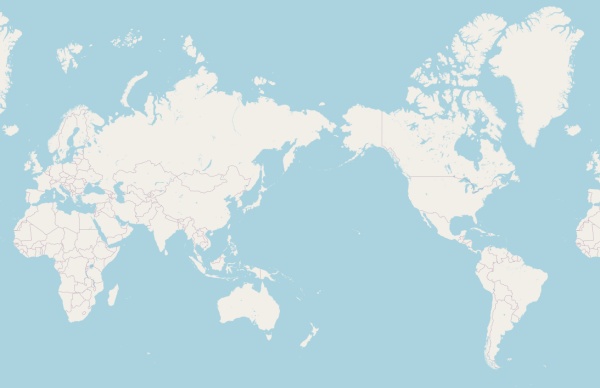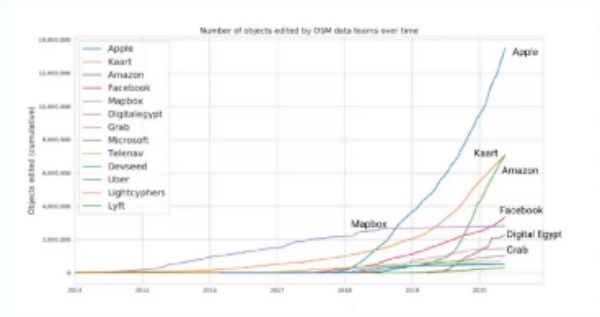OpenStreetMap is now Too Big To Stay Pure
But is that a problem, or just a warning? And of what?
OpenStreetMap (OSM) is the Wikipedia concept, ported to digital maps: an online, digital map of the whole world that everybody can edit, and everybody can reuse. If you’ve ever opened Snap Maps or Apple Maps or Bing Maps or maps in a Tesla, you’ve used OSM.

OpenStreetMap!
</em></u>
OSM is now at the center of an “unholy alliance of the world’s largest and wealthiest technology companies”, that treats it as “critical infrastructure for some of the most-used software ever written”.
Facebook, Apple, Amazon, and Microsoft are ally now eagerly investing, in and collaborating on, OSM at an unprecedented scale.
Why?
For those companies, says the post, OSM is an invaluable, strategic, voluntarily-maintained data asset that not even they can afford to replicate.
Not only was there already significant corporate investment happening in OSM in 2018, but in many cases corporate editors were responsible for the majority of edits in the specific geographies they were focused on.
For instance, it seems that Tesla using OpenStreetMap for its auto-summon feature resulted in lots of parking lots being added to OSM by Tesla employees, or users. In general, in areas where corporate teams are active, on average, “non-corporate editors are now responsible for less than 25% of total road editing activity, which is down from closer to 70% in 2017”. And this trend seems in very rapid acceleration:

So far, over 1.5M people have edited OSM (with about 1.4% of contributors doing 90% of the work). Part of that community now worries that OSM is “being irreversibly adulterated by these profiteering intruders”. But, says the post, those companies are actively contributing, not profiting of someone else’s unpaid work. Therefore, concludes the post, it is very clear, and very good, that both Big Tech and a community of volunteers “all want an accurate, ubiquitous map of the world that can be maintained in perpetuity as sustainably as possible”.
Aligned? Not exactly
The goal of the OSM community may be naive, or simply unfeasible, but is exactly (as far as I can tell) what the post says:
“an accurate, ubiquitous map of the world that can be maintained in perpetuity as sustainably as possible, “, for the common good
The goal of those corporate contributors, instead, is (besides not depending on Google Maps, which would be 200% OK!) to have exactly the same type of map for adding mapping support to their panopticons, that is, as the post itself says:
- “build new types of digital experiences that interplay with the real world”
- “to be with you literally every where you go, and constantly seduce you with entertaining and immersive experiences”
So yes, for OpenStreetMap, and for all its users, it is good that companies with so much money that they’re becoming banks actively improve it. But what really matters for everybody, including people who’ll never know what OSM means, is to check, and likely regulate, what the same companies do with OpenStreetMap afterwards.
Who writes this, why, and how to help
I am Marco Fioretti, tech writer and aspiring polymath doing human-digital research and popularization.
I do it because YOUR civil rights and the quality of YOUR life depend every year more on how software is used AROUND you.
To this end, I have already shared more than a million words on this blog, without any paywall or user tracking, and am sharing the next million through a newsletter, also without any paywall.
The more direct support I get, the more I can continue to inform for free parents, teachers, decision makers, and everybody else who should know more stuff like this. You can support me with paid subscriptions to my newsletter, donations via PayPal (mfioretti@nexaima.net) or LiberaPay, or in any of the other ways listed here.THANKS for your support!